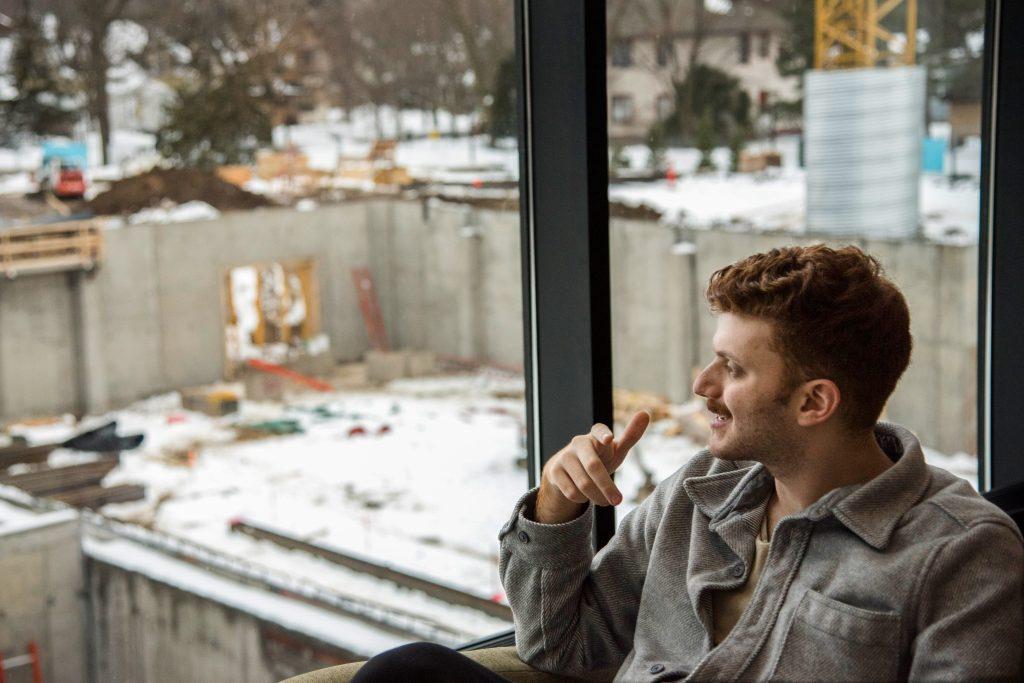
The Mac Weekly: Can you give me your playbill bio off the top of your head for any readers that might not know who you are or what you’re about?
Michael Karadsheh: My name is Michael Karadsheh. I am a 21-year-old actor from Holland, Michigan, which is a small beach town in Michigan near Grand Rapids. I’ve been acting since I’ve been in middle school. I’ve been in a variety of productions including several competitive productions, I did a lot of competitive theater when I was in high school. And I believed I was going to give it all up when I came to college but then everything changed pretty rapidly when I realized that there was something really deeply missing from my life and I figured out that that was theater. That was the thing that was really driving me and when I lost that for awhile I just couldn’t put together any of the pieces of my life because there was this essential glue that wasn’t there. And now I am here today. I am an Arab American and I have had the pleasure of working with other Arab American theater makers in the Twin Cities since I’ve been here. And yeah, I’m hopefully going to Columbia for acting, we’ll see. And that’s my life story as an artist, I guess, at this point.
TMW: So you said you started acting in middle school, tell me a little bit about that. How did it all begin?
MK: I was in a class when I was in sixth grade, and it was called…it was just a drama class that they offered, they decided to offer a drama class for sixth graders. This is actually really funny. And the first play that we were going to put on was “Superstar.” Do you know “Superstar” the movie?
TMW: No, I don’t.
MK: You know the movie with like Will Ferrell…
TMW: Oh wait! You mean the Comedy Central type movie?
MK: Yes! With Will Ferrell. So inappropriate! We got this script and everything was blacked out. Like all the bad words and everything…but you could kind of see all the naughty stuff underneath. Well, I had this teacher who thought she could get away with doing “Superstar” with a bunch of sixth graders for the sixth-grade play. Eventually, everyone told their parents and there was a complaint and we ended up doing “Spamalot,” about the frog. And my best friend was in that class at the time, who is actually now a playwright, whose father was a Marxist scholar named Terry Eagleton — actually really well known, is a professor at Oxford–was in Holland for a year, we were just really best friends. I remember he got the part as the lead of Frog, and I got the part of Knight. Which you know was a fine part. And you know I remember my tactic going in there, I was like I’m just going to be so loud, because I’m not the lead, I’m just going to be so loud and like so obnoxious and like that will be my way of gaining the spotlight and getting vindication for the fact that I wasn’t playing the frog.
I remember during the show I was so into it, I was so having so much fun, I turned around to exit off stage and I smacked my face right into a wall, right into the one set piece we had which was like this wall backdrop, and I just like smacked in front of it and walked off stage. And my eventual high school director was in the audience and he remembered that like always. He was like I just remembered this little boy who ran into a wall. So that was my defining feature. That was kind of what started it all I guess… (Laughs)
TMW: Running into walls.
MK: Running into that wall. Yeah. (Laughs)
TMW: Running into walls, nice. So you continued [acting] through middle school, went into high school…
MK: Well I actually didn’t continue through middle school. I was like, you know, bullied or whatever. And I switched schools for a second and went to this other school and I tried to not do theater or anything. And then I went to high school…. And I auditioned for my first high school play, which was “The Three Musketeers,” and I didn’t get in. And I remember I was so devastated. I think someone told the director, they were like hey Michael is really down about this and so he was like fine, whatever, I’ll give him a small part. So I played a blind beggar in, like, two scenes in “The Three Musketeers.” And then I just continued throughout high school.
TMW: So you really just worked that role as a blind beggar.
MK: I mean I tried. I honestly f’ed everything up. I was the worst. I always messed everything up. The first opening night of the play I had to bring off two benches on a table and I fell off the stage. Like I fell off the little platform thing and all the benches and the table flipped over and they liked started to topple over. It was the most embarrassing thing in my entire life. And it was like something that would so happen to me because everyone was like Michael is the one that like messes everything up. And I was. I was like the dumb freshman.
TMW: And so going into college, you said you were going to give all of that up.
MK: Yeah…I was doing Mock Trial actually. I was doing Mock Trial for an entire year. So I was like here’s an outlet for me to act — I did competitive speech in high school –so here’s an outlet that’s constructive but also could help me do something else with my talents that’s not just theater, but I hated it. You know I loved acting and I thought it was really fun, but Mock Trial just wasn’t my outlet. It wasn’t the way that I wanted to do it. And because I poured so much time into that I didn’t have any opportunity to audition for shows or be in any shows, because Mock Trial was so time-consuming. And I really commend anyone who’s in it because it’s so hard, but I remember I didn’t audition for the fall show and I was like “It’s over. Everything is done. I’m done acting. It’s all over.”
And then, I was in “Spring Awakening,” which was a student production. And I played this character named Moritz and I’ve always wanted to play this character because I thought he was super cool and I was like really excited for the opportunity. And then I just remember being in the show and being like this is hogwash. It was…I mean this was a student production which I should have expected, but I was always like accustomed to like more of a spectacle. You know in high school we always had the best costumes and really nice sets and all these other things. But for this it was very much like, you bring your pants, you bring your shirt, you bring your prop toy gun to rehearsal. So I was like shocked by that but I also really valued that opportunity to perform. And I remember just the way it felt was something I realized I had been missing for a really long time. So then I auditioned for another fall show with the director Harry Waters Jr. that was going to be my sophomore year show. And I was playing a faerie which was member of this gay commune [that would] all get together and they would grow all their food and ferment stuff and things like that. They were this radical outside group, sort of trying to protect themselves from the AIDS epidemic and everything.
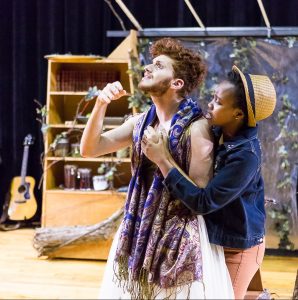
TMW: This was in “green” right?
MK: This was in “green.” I still really grew from that experience and I found that Harry Waters Jr., who was my director, trusted me. And that was something I didn’t get from high school theater because it was a lot of move there, move there, move there. It’s very oppressive, you know. And Cláudia [Tatinge Nascimento], you know director of the theater program, head of the department, she always says blocking is an oppressive term. Because it’s like defensive, it’s like you’re defending yourself from some outside force and it’s like you’re being subjected to a certain style of movement. And I didn’t realize why I hated getting so much direction from my high school director and feeling like I was always under a microscope when I was on stage and how uncomfortable that made me feel until I came to Macalester and Harry would be like, well what do you want to do. And I would be like oh well I kind of want to embroider in this scene. And he was like okay and I brought in an embroidery thing and I did that and all these other things. And I realized, woah I’m really creative in this way and very specifically in the way of creating a character and doing all these things like this is why I love theater. So yeah that was really formative for me.
TMW: What do you think is the state of Macalester’s theater culture right now and what do you think it will be going forward?
MK: I actually think we’re in a great place, you know. One of the things I really valued from Macalester was… like my Columbia application. One of my recommendations was Carson Kreitzer who is a playwright who has written a very popular play called “The Love Song of J. Robert Oppenheimer,” but you know that’s a very well known play and that’s a play that Columbia did the year before in 2017. So she was a name that was fresh in their heads and she was writing my recommendation letter, like I took a playwriting class with her, you know. We are in one of the biggest theater cities in the United States and that means a lot. And now with Cláudia, the head of the department, she really understands that. And she has more connections than I’ve ever met of any theater maker ever. And that’s maybe saying something to how young I am, but also she really does have the connects and she really does know her stuff and she’s really trying as hard as she can to get students out and watching theater and doing theater and getting workshops done. Like I just did a playwriting workshop with Paula Vogel, who is one of my icons. I’ve read plays of hers in my classes and Cláudia was able to get us, like 12 of us, to sit down with her for six hours and for her to give us advice on playwriting. That is indispensable. I’ve told other people at other schools and they can’t believe it. Because she is Pulitzer Prize-winning, she’s one of the biggest names in theater today. She just had a play on Broadway. Like what. She was nominated for a Tony award. And she was teaching us. And it’s like that kind of dedication that I see here.
The theater program here isn’t the best, it’s no secret. It’s small, not very many people come to the shows. But the faculty that they can get here: super great. If you have the dedication and if you are really doing the work and you are really taking advantage of all the opportunities, then this can be one of the best theater departments that you can go to. Because it’s small, people will pay attention to you and focus on you, and you’re in the Twin Cities. There’s nothing better. For the people that I see as first years now, not only are they so talented, but they are about to inherit some really kickass faculty members. And they’re going to have real organization because Cláudia is not messing around. She was at Wesleyan for so many years, she knows what she is doing and she is ready to take this theater department to the next level because it can be there. The potential is so so there and it’s so ripe.
I just think about my own experience and all of the people I was able to meet and the application I was eventually able to put together and the culmination of all my work. I remember I met Paula Vogel two years prior to doing to workshop with her, and I just remember I was with Harry Waters Jr. and Carson and we were just standing there after the talk. And Harry and Carson were just like hey Michael, we are here for you. Like we are supporting you. Like if you ask us for anything we will do it. And I remembered that. And they were like this doesn’t happen very often where you have people who are really trying to support you here. Because they were trying to motivate me to continue to do my work because I was obviously not going to because of my parents and because of how I felt about them. And I just remember thinking in that moment, how am I so fortunate? I didn’t come here thinking about the theater department at all. But here are two people who are really doing work in this field, like a lot of really great work, and they are telling me that they support me. Bam. I’m ready. I felt like that was huge.
TMW: So you talked about some of the support you’ve received at Mac, what about your parents. You’ve brought them up a couple times. How are things there? Has anything changed?
MK: Yeah, I think when I got accepted to Columbia I think that they realized that this is a really good opportunity that you can’t pass up. And they were like okay. Still, they were a little bit apprehensive because they don’t know if they can afford it. Which is valid, because it is very expensive, it is absurdly, ridiculously, ungodly expensive. It doesn’t make any sense for a theater degree. I’m trying to get as much financial aid as possible, but if I can’t it’s a very good possibility that I will not go. And you know it’s something I still deal with.
You know when I declared a theater major, I’m now a theater minor, just because I couldn’t deal with having to explain why I was a theater major all the time and like why and what I was doing, getting all the disappointing looks, or do all of that. You know when they found out I got called back, it was very much like just like “hey he got called back from Columbia, cool. What’s next? How are your grades?” You know what I mean. And that’s just how I live my life. And that’s fine. My father works 12 hours a day, 6 days a week at his business, which he’s owned for 20 years, it’s a grocery store. I’m not going to make him work another 10 years for 60 hours a week so I can go to acting school. It’s kind of selfish. And there are these kids out here and people out here who want to tell me all the time, oh well I don’t understand why you’re not doing this, I don’t understand why you’re not a theater major. Well, it’s like you don’t understand what I’m sacrificing by doing this.
It’s a sacrifice every single day. When I got a call and I talked to them about that my mom was like ‘wow it’s going to be so expensive.’ And then I yelled at her because I was like, I just got into an Ivy league institution, one of the top five acting schools in the country and you can’t be happy for me and can’t say that you’re proud. And then we got into this whole thing and then at end my dad said he was proud of me for something I accomplished in theater and I broke down. My mom was like “What’s wrong?” And I was like I’m crying because I’m happy and she was like “Why?” And I was like girl, you want to tell me not to do theater my entire life, and it’s just a hobby and then finally one day, tell me you’re proud of me because I did something and accomplished something and then you’re going to ask me why I’m crying? It’s just ridiculous. So I think things are better. It’s not like they’re going to support me through this — I have to make my own money, I have to figure it out, but it’s what I’ve always wanted to do. And to get their support means everything. It truly means everything.
I mean to not get their support also means everything. Theater is a lot of time. Theater is a lot of work. You got to rehearsals every day for three to four hours a day. That’s not something you can juggle very many other things with it. So if you’re putting your time in, you have to have this mentality and this self-assuredness that you are spending your time wisely. Otherwise, you will just feel bad about yourself. And a lot of times, I’ve just spent feeling bad about myself and feeling like I wasn’t spending my time constructively and I was being selfish because I wasn’t getting an internship and instead I was doing a show. So.
TMW: So is Columbia kind of your validation?
MK: Columbia is very much my validation. It’s very, very much my validation. I mean I also got into a couple other schools and that was validating too… but for Columbia to call me during one of my classes and say we really want you here and we think you’re special and there’s only one person like you in the world, that was like everything I ever needed.
TMW: So when I was looking at some of your acting credits here…
MK: Not very many. (Laughs)
TMW: No, no, no, there are. In terms of what Mac puts on each year there are. I feel like a majority of the work you’ve done cover topics like class critiques, capitalism, social responsibility, climate change. And of course some of that is just by the nature of the material Mac puts out, but then you also did “Does This Feel Good” with the Sexy Trainers…
MK: Oh yeah, I did do that.
TMW: … and you did “Sabra Falling” in the Twin Cities…
MK: Oh yeah! I did do that.
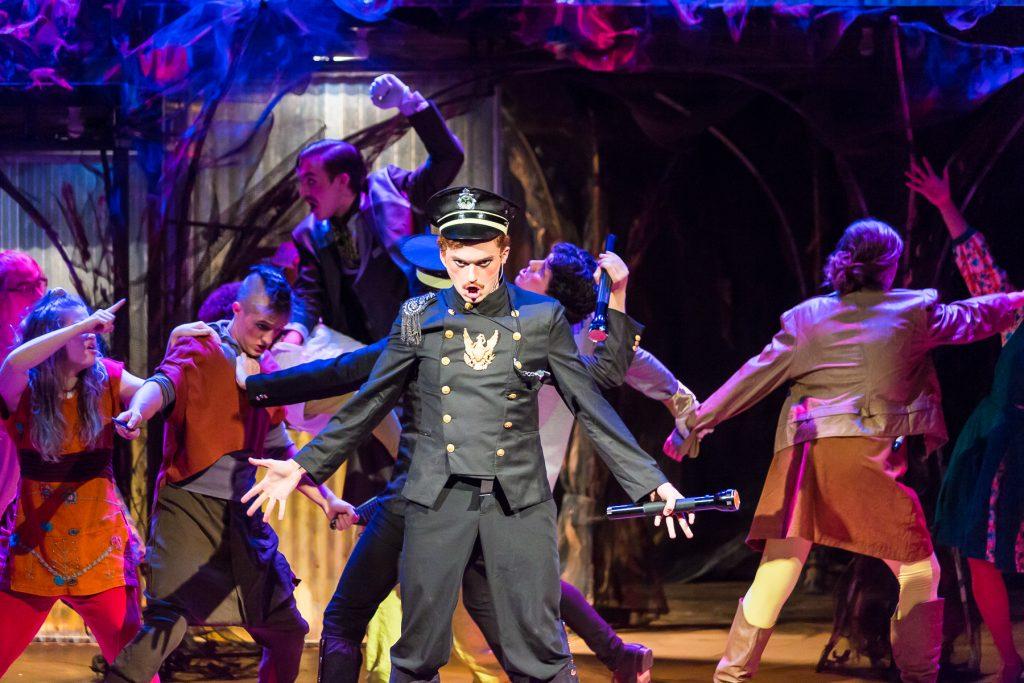
TMW:… So I feel like there are undertones of political awareness in the work that you’re doing. Do you plan to continue that political awareness or are there going to be other motivations to the type of work you’re seeking out in the future?
MK: I wrote in my statement to Columbia, and something that I’ve been very intense about in my entire process was that partly why I want to do what I am doing is because I want to be a voice to a community that is small, that is existing in the United States and that is grossly misrepresented obviously, that is as an Arab American. One thing I like to say is that I want to show people that not only are Arab Americans everywhere, but they look and they talk and they are you, you know what I mean? Even though I don’t look like what people would consider as typically Arab you know because I have red hair and fairer skin, that’s just a genetic anomaly really. If you look at pictures of my parents it’s surprising that I came out looking like I do. But I still think there’s something valuable in that familiarity and using my platform and my privileges that I do have to give voice and give rise to something that I think it really important is really why I want to pursue this theater impulse.
And also, doing “Sabra Falling,” I realized, looking around I looked at all these young Arab American actors and it’s the first time I worked with almost all Arab American actors and we were all really dedicated to doing the work and we all had really deep intrinsic connections to the story that I’d never really experienced before, but not everyone had the training, because that’s just the reality of being an Arab American in this climate politically and in this country. A lot of us are immigrants. Middle Eastern immigration only started really picking up in the last 40 years so we’re finally getting to a point where we have a community and it’s time to take that community and bring it to a platform like theater and to cultivate what I call an Arab-American aesthetic which is a term that was given to me by Cláudia actually.
She was like “What do you want to do. Why are you different from everyone else that wants to get this degree?” and I was, like, well you know I’m an Arab American and I want to give voice to that, I want to be able to be given a platform for that and she goes “Well what makes training an Arab American different from training another actor?” and I couldn’t answer that question. And she said because what you’re really wanting to do is cultivate an Arab American aesthetic around theater, you want to be able to embody– because there is a very particular way in which I’ve noticed a lot of writers articulating their experiences as Arabs or Arab Americans or Palestinians, whatever it may be. And that cultural aesthetic or how that looks or how that sounds on stage is something that has not fully been realized by a lot of actors and playwrights and producers of Arab American work because there aren’t very many of us out there right now and there isn’t a huge canon to look back on. But to be able to work with that and to cultivate that and to have a more coherent vision is indispensable to this art form growing, not only among Arabs in the community but to these stories being told on a broader national scale.
TMW: So should we expect you growing this Arab American aesthetic only as an actor or are you going to be doing this in other ways?
MK: I don’t know. I mean I used to be a playwright. I’ve written a couple plays and I’ve sent them around and I’ve done a couple things in that realm. I think at Columbia I’m going to be really focused on acting but part of it, what I want to do with training there, is to really open myself up because you know I do have a lot of self-doubt. Because being told not to do something for so long and not getting validation from it except by like other people’s parents or other people, that’s huge. It can really do something to your mental processes. It’s something that I’ve determined for a long time and I’ve doubted myself so harshly and I’m ready to relinquish that and kind of get out of myself and who knows, when that happens, or if that happens, what I’ll end up doing because I think that it’s limitless you know? Producing, writing, acting. Who knows where I’ll go. And I see all these playwrights out there and I have all of these anthologies, you know there’s writing out there that’s being done out there by all of these Arab Americans but I don’t know if there’s first of all the production or the actors for it. That’s a void I’d like to fill and I know that’s why Columbia was interested in me as a candidate.
I mean I went in there with like nothing. I had a black and white headshot that I had from “Sabra Falling” that someone gave to me, I didn’t pay for a headshot. I’m not a theater major. I had one professional production outside of Macalester that I’d done. The people I was going against were 27 years old. They were actors, they had agents, they’d been working in New York for six years. But what they were interested in was investing in my voice and investing in me by giving me the training even though I didn’t come in with the training.
There’s a recent show on Broadway called “The Band’s Visit” starring Tony Shalhoub, Monk, that I saw while I was there, while I was in New York. And I just remember first of all immediately calling my mom afterward and being like I can’t believe I just watched this. They were talking about Umm Kulthum and Omar Sharif and they were singing songs about what it was like to be Arab. And I immediately had to tell my parents and people were laughing at me because I was telling my parents, “they were saying things that you tell me” and they were speaking Arabic on stage and not because they were terrorists. That’s work that’s burgeoning. There’s a seed there. I really do think that this is my time to start to grow because there is fertile soil for that growth to occur and was in that climate in that period that not only is the community big enough that we have a voice but the social climate requires that we have a voice.
TMW: If future Brian Rosenberg calls you up in 10 years and says will you speak at commencement, will you do it? Asking on behalf of future Mac grads.
MK: Maybe. If I do anything important enough for that. I was actually nominated to speak for commencement this year, so I might do it. I haven’t decided yet. I know a lot of people who have a lot to say who really want to and I don’t know If I have that same dedication or if I have enough to say right now. I feel a lot about this institution and its not particularly bad things, especially with my admittance I’m really grateful to be at Macalester because a lot of the reason I think I was able to do that is because I’m here at this place at this time, but what I would want to tell people I guess and what people have told me. Like this first year: Ogechi [Egonu ‘21] was like “thank you for doing this because now I feel like I can or at least I know that there’s that opportunity” and that’s a lot like how I’ve always felt about this institution, like seeing people who are older than me or seeing alumni, like Danai you know, she made it. And that’s not the end goal all the time in theater, there is potential in anybody regardless of where you are and within this school, there is potential to grow….
TMW: Is there anything that I didn’t ask you or that we didn’t cover that you’d like to say to the readers of The Mac Weekly?
MK: I think I would ultimately leave with the people that are doing arts here, or want to pursue a career in the arts, for me at least the best thing that I could do was to put myself out there in more ways than one. Like auditioning for Sabra Falling or auditioning for all these other places even though I didn’t even think I wanted to go to grad school. That these things aren’t a measure of your talent, they’re more of a measure of your readiness at a time or a place and that’s good to know whether you get what you want. A lot of times rejection is no I don’t think you’re talented it’s no, not now. I’m positive that I wasn’t the best actor that went to those call backs like there’s no way I was because I’m not experienced, people had loads on me, but it’s more than that, everybody has something to offer and I really do believe that.
In the print version Githinji was misidentified. *The Mac Weekly sincerely apologizes for this mistake

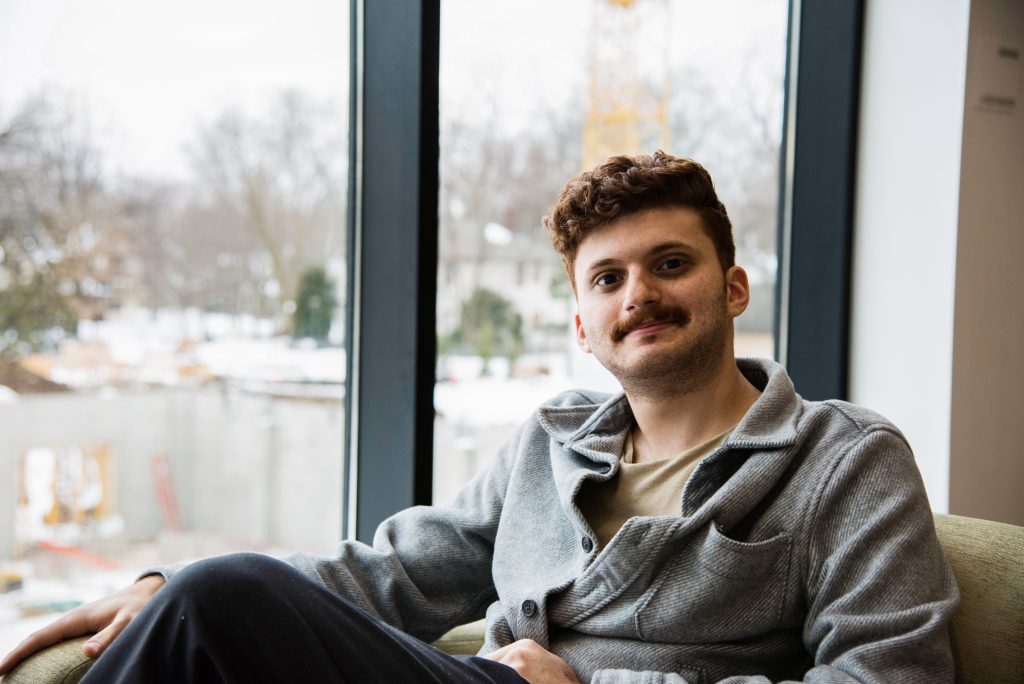






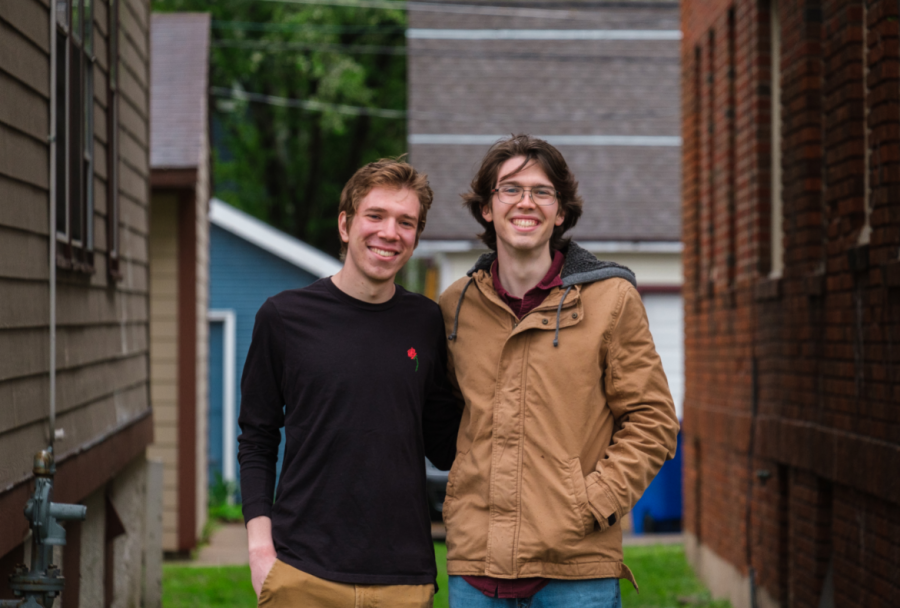
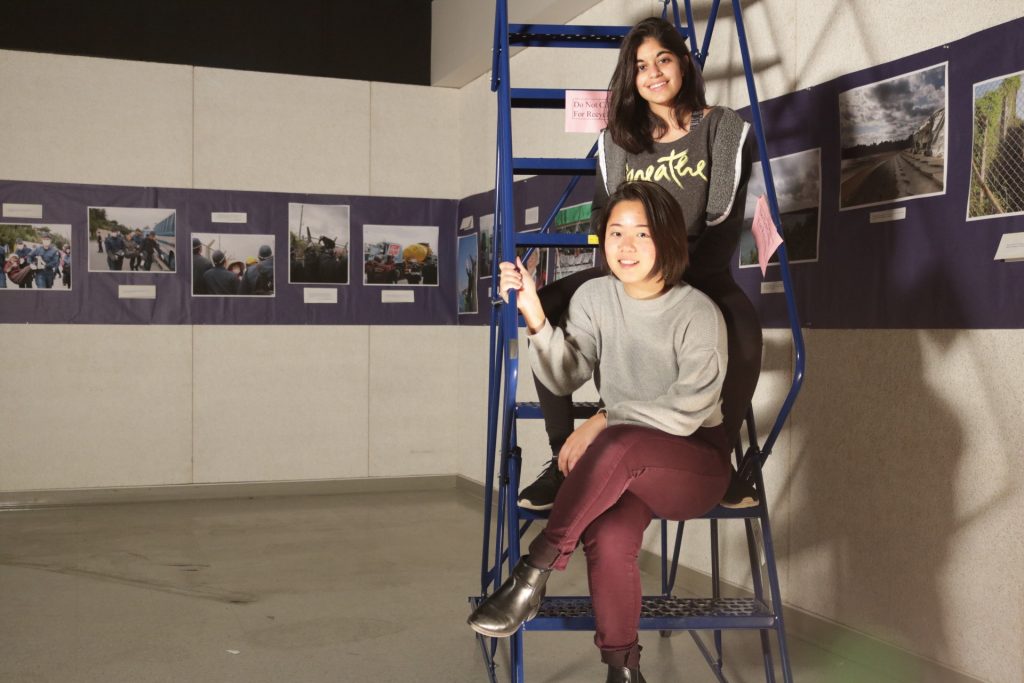
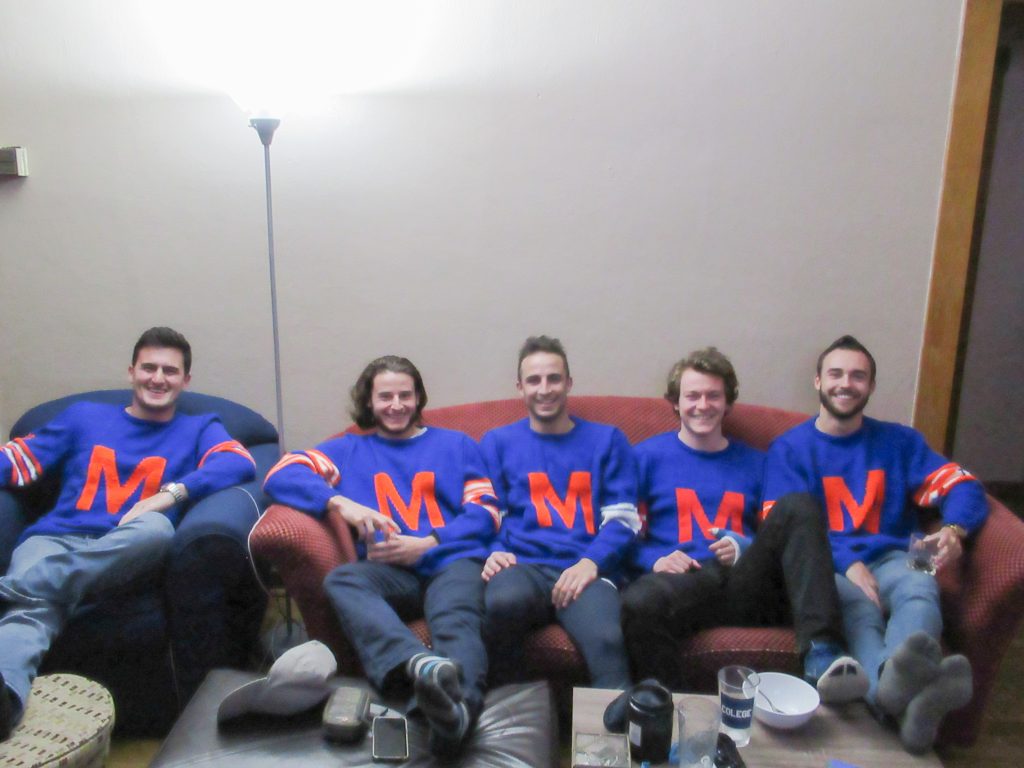
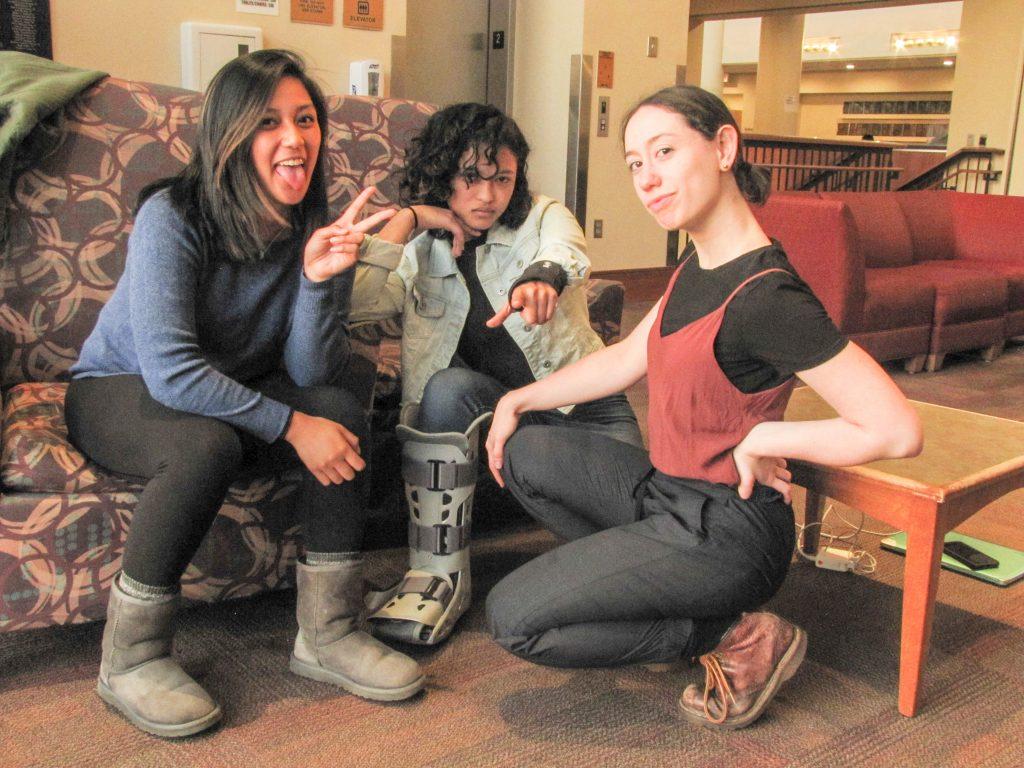
Claire Wilson • Sep 8, 2019 at 1:00 am
Great site! I am loving it!! Will be back later to read some more. I am bookmarking your feeds also.